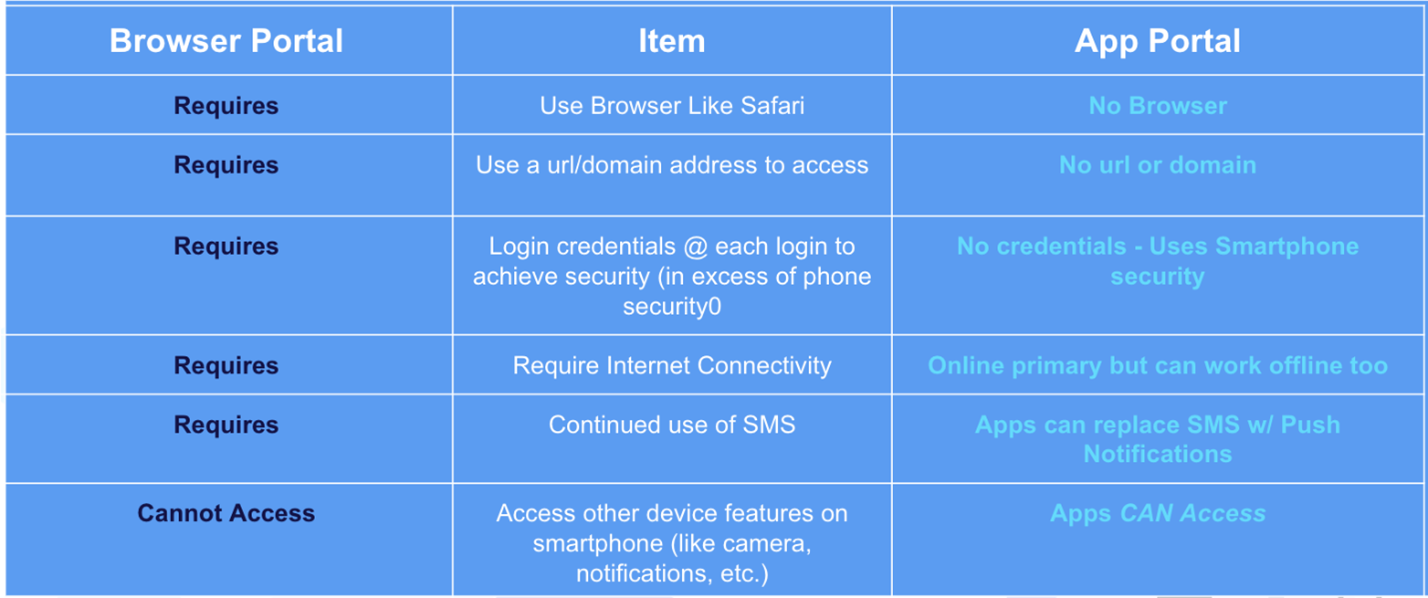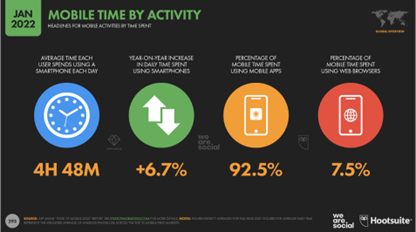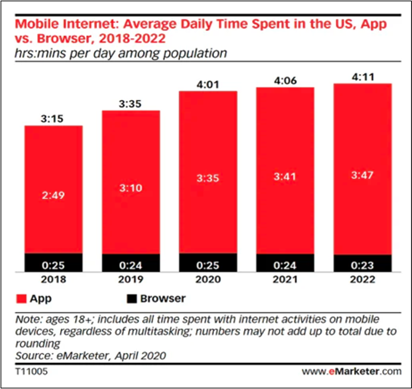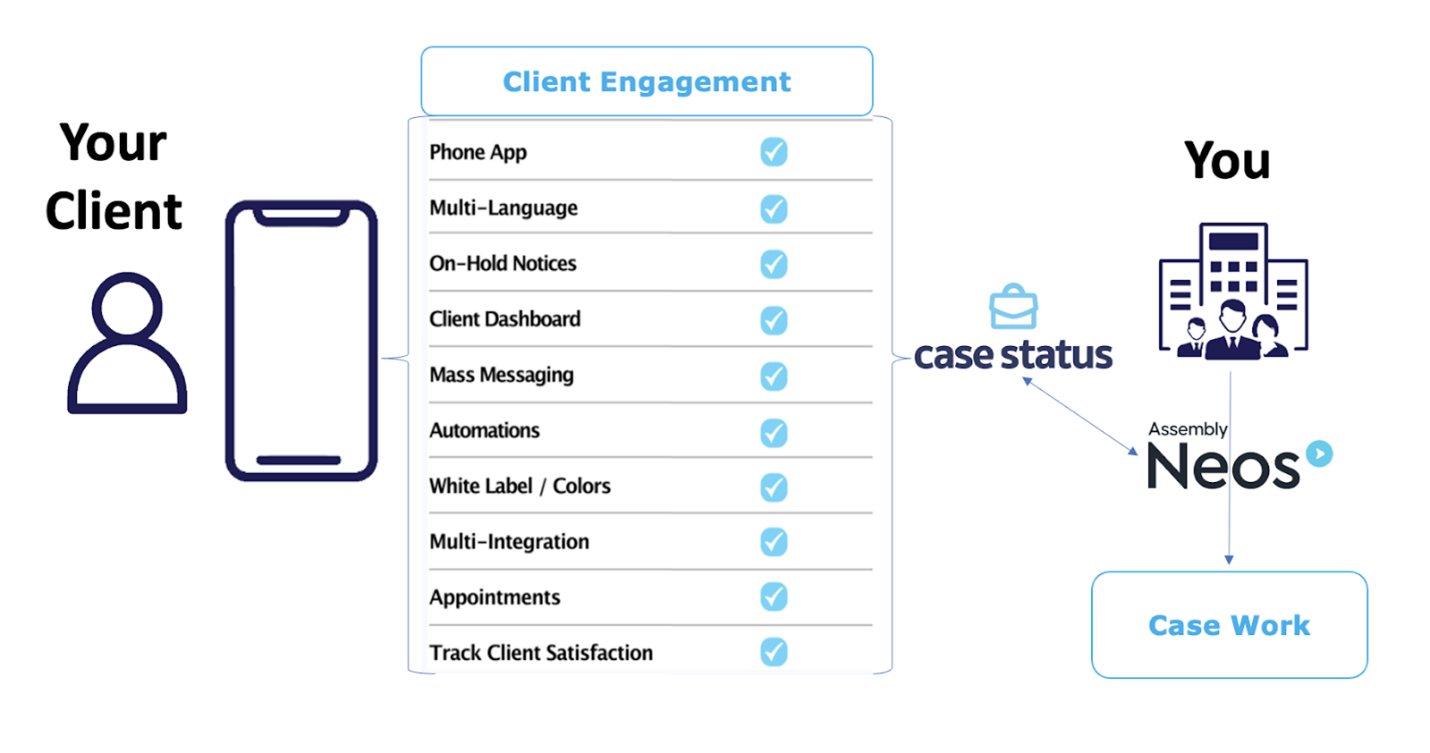
Legal Trends, Hybrid & Remote Work
Effective communication plays a vital role in shaping the success of cases and building solid and long-lasting relationships with clients.
Legal Trends, Hybrid & Remote WorkMay 30, 2023
As a legal professional, you have the incredible opportunity to change a client’s life for the better. Effective communication plays a vital role in shaping the success of cases and building solid and long-lasting relationships with clients.
One strategy that can make a significant difference is meeting clients on their terms. In today's digital age, this often means embracing email, client portals, and text messaging as communication channels. While you might already be familiar with email and text communication, let's explore the potential of client portals to further enhance client relationships.
In this article, we'll delve into the world of client portals and how they can help you foster stronger connections with your clients. But first, let's take a moment to understand the delicate balance that law firms must strike.
Every lawyer faces the challenge of balancing client engagement with achieving successful case outcomes. Both elements are essential for the sustainability and reputation of a law firm. It's crucial to deliver favorable case results while ensuring clients are genuinely satisfied with the service they receive. After all, clients expect proper communication, transparency, and follow-through—essentially, empathetic engagement.
Empathy is a non-negotiable aspect of client engagement in the context of law firms. Clients often seek legal assistance during challenging periods in their lives. It's essential for them to have confidence in their lawyer's competence and compassion, knowing that their lawyer understands the gravity of their situation and is there to fulfill their emotional needs. Providing constant updates and guidance throughout their legal journey reassures clients that they have chosen the right legal team.
One common complaint from clients revolves around the lack of communication from their legal team. However, achieving empathetic client engagement is more complex than it may seem. Balancing the demands of handling multiple cases and engaging with clients within tight timeframes and looming deadlines requires finesse. This is where client portals can be a game-changer.
Imagine an application that facilitates effective communication between you and your clients, empowering them with the tools they need to monitor and manage their experience independently, without the need for constant phone calls or manual updates. That's precisely what client portals are designed to do.
Client portals serve as extensions of the back-office CRM (customer relationship management) systems within law firms. While the back office runs on case management software like Neos, client portals consolidate all the relevant information in one convenient location and connect with the back-end functions used by legal staff to handle cases. Think of these portals as a "window" or "door" into their case, displaying only the information that is relevant to each client.
The features and functionalities of client portals can vary, as they are often customized to fit the specific needs of each law firm. Below are some common functionalities you can expect to find within a client portal:
Self-service dashboards offer clients an overview of essential information related to their legal case. It’s where they can see recent updates, notices, communications, and upcoming meetings at a glance.
While phone and email have traditionally been the primary means of communication in business settings, they may not always suffice when it comes to maintaining consistent and timely exchanges with clients. Client portals provide a smart solution by combining preferred channels like text, email, and video calling with customized messages, automated workflows, and notification systems to ensure no important engagement is missed. Real-time translation features can also facilitate communication with clients who speak different languages.
As a lawyer, it’s important to empower clients to find answers to their questions and concerns promptly. Using a portal to house a comprehensive FAQ resource ensures answers are available 24/7 without having to wait for a response from your firm. By giving clients the tools to answer their own questions, you’ll be able to resolve issues faster while allowing legal staff to focus more on advancing client cases.
Client portals can deliver real-time updates that provide continuous and up-to-date information on the status of a case. All updates are consolidated into a log, allowing clients to review the progress over time. Many client portals offer an automated notification to clients via email or text whenever new updates or changes are made, keeping clients in the loop without any effort.
Efficient and secure file sharing is crucial for the smooth progress of any legal case. Client portals offer a secure and convenient platform for clients and lawyers to access, share, add, and view documents and related materials. This capability allows both parties to collaborate effectively and keeps case information updated across the entire system.
Legal cases often involve multiple stakeholders, including paralegals, assistants, and administrators. Client portals provide a collaborative space where all relevant parties can come together, ensuring seamless coordination and effective teamwork. Including everyone involved in the same space fosters a collaborative environment that allows all team members to work towards a successful resolution in sync.
Providing clients with an organized task list inside the portal helps improve case velocity and ensure efficient progress. These checklists outline the necessary paperwork and items that need to be accomplished at each stage of a case. Having a clear roadmap of tasks supports the momentum of your case, ultimately leading to a faster resolution.
Many client portals offer integrated calendar features that serve as valuable assets for scheduling appointments, planning meetings, or setting case reminders among multiple parties. These features simplify the scheduling process and, when connected to a case management system, seamlessly work off the data stored within. With the calendar functionality, you can efficiently manage your appointments and ensure smooth communication and coordination with all relevant parties involved in every case.
While client portals tend to offer similar functionality, there are two distinct types to choose from: browser- and app-based.
You can access the portal via a browser like Safari or Chrome on any device with an internet connection. However, if the portal was built specifically for desktop, accessing it on a mobile device or tablet may not deliver an optimal experience.
A client portal application is designed for mobile use and can be downloaded from either the Apple Store or Google Play Store onto a smartphone. It is not usable on a desktop.
Both types offer features like consolidated communications, personalized client experience, accessibility from anywhere, etc. However, there are some significant differences, like the login process.
The chart below outlines the key differences between browser and app portals.

Keep in mind that mobile reigns supreme in today’s digital-first culture. Consumers spend almost five hours every day on their smartphones.

The multi-year trend is even more telling; app usage continues to rise as browser usage declines.

Regardless of whether the portal is app or browser-based, it still needs to provide high utility for the client and showcase all the work that is taking place on their behalf.
For example, a client portal needs to:
If your portal delivers on these performance criteria above, your firm will enjoy many benefits, such as:
In today's digital age, the legal industry is witnessing a transformation. Clients have become accustomed to streamlined online experiences in various aspects of their lives, from shopping to banking. They expect the same level of convenience and accessibility when interacting with their legal representatives.
By embracing client portals, law firms can adapt to this changing landscape and meet clients' evolving needs. These portals not only enhance communication but also improve efficiency and productivity within the firm.
When selecting a client portal solution for your law firm, it's essential to consider several key factors:
Legal matters involve sensitive information, so prioritize a client portal solution that offers robust security measures. Look for features like encryption, secure data storage, and user access controls to ensure the confidentiality of client data.
Opt for a client portal with an intuitive and user-friendly interface. Your clients should be able to navigate the portal easily, access information effortlessly, and communicate with your firm without any hassle. Consider user experience and ease of use when evaluating different options.
Choose a client portal that allows you to customize its appearance to align with your law firm's branding. This helps create a consistent and professional image for your clients and reinforces your firm's identity.
Assess whether the client portal solution can integrate with your existing practice management software. For successful client engagement, it is crucial to connect the client portal with your existing back-office casework. This integration ensures that work is not duplicated but rather maximizes the utilization of your case management platform, seamlessly transferring relevant information to the client portal and vice versa.
Integration plays a pivotal role in staff adoption, which is another critical success factor. When launching a client portal, you want your staff to incorporate it into their daily routines with minimal disruptions. Ideally, they should be able to primarily work on the case within the case management platform. For instance, when sending a message to a client, it should originate from the case management solution and appear on the client portal's smartphone without requiring additional effort or navigating different software. Similarly, when the client responds, the message should automatically be recorded as a note on the case, alerting the team of the new message. This streamlined integration empowers staff to focus on casework while effortlessly maintaining client engagement.
Automation plays a crucial role as clients progress through various stages. When the team updates a stage in the case management software, the integration should automatically update the client with relevant information without staff intervention. Additionally, during periods when the case is progressing according to plan but there are fewer updates to share with the client, proactively notifying them that they are still on track helps maintain trust and confidence. Automatically informing clients about the ongoing work within the case management software fosters scalable and empathetic engagement.
Consider Neos and Case Status. As the top client service software for law firms, Case Status is solely dedicated to client engagement through its robust mobile client app portal. The integration between the two platforms effectively combines all the client engagement benefits of the client portal while seamlessly connecting back to Neos.

By leveraging integration between your client portal and case management application, you can optimize both staff and client adoption, achieve efficient automation, maintain trust and confidence, and enhance the overall client experience. This integration ensures that client engagement aligns with your case management processes, creating a harmonious and efficient ecosystem for your firm.
Giving clients access to their case information and the ability to communicate with their legal team are not just nice-to-have features; they are now expected by clients. Empowering clients to self-serve their needs through a client portal allows your team to focus on driving results and efficiently running the case. Even if client portals are not on your radar, it's important to continually learn about their benefits and when they can effectively address real pain points.
Start by measuring the volume of emails and phone calls that ask the same question: "What's going on with my case?" Consider how much time your staff spends fielding these requests and how it affects their ability to focus on more critical tasks. Identify areas where cases might experience delays due to clients' lack of responsiveness or urgency. Evaluate your client satisfaction levels and the number of positive reviews your firm has on platforms like Google Business. This assessment will help you recognize client portals as a worthwhile investment that deliver rich dividends for your firm.
By embracing client portals and providing a transparent and convenient experience for your clients, you can enhance client satisfaction, streamline communication, and improve overall efficiency in managing cases. Keeping abreast of evolving client expectations and leveraging technology to create a client-centric approach will set your firm apart.
Stay tuned for the upcoming Neos integration with Case Status, the client portal that transforms how you engage with clients. Bring the automation and workflows you know and love from your back office to your front office, accessible by your client via a 5-star smartphone app.
Register here for the webinar, The Future of Client Communications on June 1, 2023, to learn more about changing consumer trends are changing and how the legal industry is poised to take advantage of these changes.
Register here for the webinar, The Future of Client Communications on June 1, 2023, to learn more about changing consumer trends are changing and how the legal industry is poised to take advantage of these changes.
SHARE